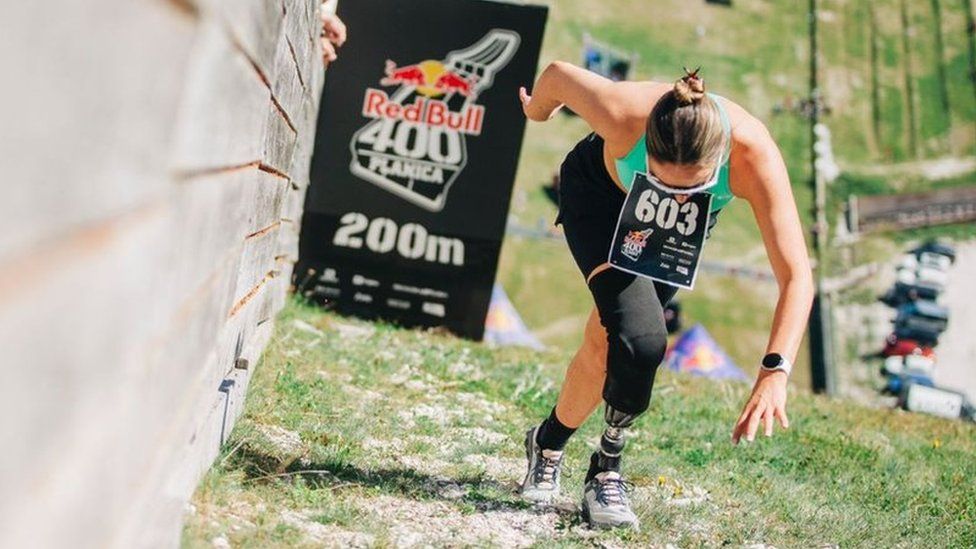
Milly Pickles completed the 400m race up a Slovenian ski resort’s flying hill
By Charlotte Simpson & Riyah Collins
BBC Newsbeat
“As an amputee, you avoid hills, you avoid rocks,” says Milly Pickles. “Because you can’t feel your foot and you don’t know what’s going to happen.”
Milly’s just returned from Slovenia, where she competed in the Red Bull 400.
Known as the “world’s steepest race”, it’s an all-out 400m (1,310ft) sprint up a ski slope with inclines of up to 75 degrees.
“It was unbelievably tough, it was so awful,” Milly tells BBC Newsbeat. “Every time I looked up, it felt like there was forever to go.”
Despite that, the 26-year-old did reach the finish line, becoming the first amputee to do so.
And Milly says she’s never felt prouder – not least because she’d been unable to train until a week before the race.
A complication with her prosthetic had left her unable to walk for about three months, so Milly was “shocked” to even complete the challenge.
“It means the absolute world, because it’s like I did the impossible,” she says.
Milly was 20 when she had to have her right leg amputated below the knee after she was electrocuted in an accident.
“It completely changed my life,” she says.
“I understood the value of life. Now I’m so grateful to know that I am alive.”
Image source, Milly Pickles
Milly, pictured aged 20, has shared her recovery online to inspire others going through a similar experience
Milly, who is from Hertfordshire and now lives in London, threw herself back into her degree, trained for the Paralympics and shared her recovery online with tens of thousands of followers.
She then decided to take on the Red Bull 400 – a test that brings particular challenges for an amputee, according to Milly.
Firstly, her choice of prosthetic.
“You would think blades would be really good for it,” says Milly.
“But the hill is so steep, you can’t even push yourself into the running blade to then propel forward.”
Image source, Milly Pickles
Milly says her running blade was not suitable for the uphill race and instead opted for her “walking leg”
She opted instead for her “walking leg” which she says “loves to twist a lot”.
“Obviously I can’t feel what I’m doing, so when I put my foot down I don’t know if it’s actually safe or not,” says Milly.
“I was just having to really trust in my prosthetic leg.”
Milly also had to consider the best way to remain balanced.
She says she slipped a few times but was focused on finding spots where fellow competitors had put their feet to help.
“Not having an ankle really limits me as well because if I was to fall, which I did, you can’t really move your foot to save yourself,” she says.
Milly completed the course in 17 minutes and 26 seconds and says: “Your mind gives up before your body does – my mind is what got me through.”
“I was just so happy that I’d finished,” she says. “I’ve been crying for days, because I’m just so proud of myself.”
Image source, Red Bull
Milly says the final climb of the race was “essentially straight up”
Despite the huge physical demands of the race, Milly tells Newsbeat she hadn’t been able to train much beforehand – just six days, in fact.
Earlier this year she got a sore that took longer than expected to heal, meaning she couldn’t wear her prosthetic, and therefore walk, for about three months.
So when the event drew closer, she didn’t feel super-prepared.
“Physically, I was weak,” she says. “I was not ready for it at all.”
Milly says she couldn’t stop crying as she approached the starting line and the realisation of what faced her sunk in.
She says: “I just thought, ‘What on earth am I about to do?’
“That’s when it really hit me that I’m an amputee, I’ve got three toes on my human foot, I have not walked for three months this year… and I am about to do it.”
Image source, Milly Pickles
Milly says she also wanted to use her run to raise money for charity
Milly is planning to compete again next year – hopefully with a bit more training under her belt – to improve on her time.
She also dreams of running a marathon in the future.
Milly says it’s important to her that she shares her journey to inspire others.
“When I first lost my leg, I was desperate to find other amputees like me,” she says.
“All I wanted was to see where I would be in the next five, six years, but I had no-one for that.
“So when I started sharing my journey online, that’s when I thought: ‘OK, I can be the person that I never had for other people’.”
Her advice for anyone going through a life-changing event?
“To take a step back, sit back, but then get ready for your comeback. There’s so much life to live and I’m just grateful to be alive to live it,” she says.
“So leg or no leg, at least I’m here.”
Related Topics
Related Internet Links
The BBC is not responsible for the content of external sites.








